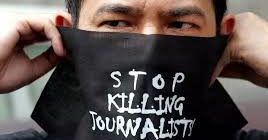Gumaro Pérez Aguilando was gunned down on Tuesday while attending a Christmas event at his son’s school in the Mexican state of Veracruz. Miroslava Breach was shot to death in March while she drove her child to school in Chihuahua state. In May, Javier Valdez was pulled from his car in broad daylight and murdered outside his office in Sinaloa.
All three victims had something in common: They were journalists.
According to a report released Thursday by the Committee to Protect Journalists (CPJ), Mexico was the deadliest country for reporters in 2017, excluding Iraq, Syria, and other nations with active war zones. At least six journalists were murdered in Mexico this year in reprisal for their work, and three other killings remain under investigation.
Overall, the CPJ reported that at least 42 journalists from around the world were killed on the job in 2017. It’s actually a slight improvement from last year, when 48 journalists were killed globally. But Mexico is bucking the trend, and it’s not hard to see why: The killers of Mexican journalists are literally getting away with murder.
“Impunity continues to fester in Mexico,” Jan-Albert Hootsen, the CPJ’s Mexico representative, told VICE News. “Journalist murders hardly ever get investigated, they hardy ever get prosecuted. As that situation continues, the violence continues to be exacerbated.”
The CPJ reports that at least 95 journalists have been killed in Mexico since the organization began keeping track in 1992. Of those, at least 43 were killed in reprisal for their work. Over the past decade, at least 21 killings of journalists were perpetrated with what the CPJ called “complete impunity,” meaning there were no arrests or prosecutions.
The case of Javier Valdez was perhaps the most egregious. Known for his trademark Panama hat, the 50-year-old was among the most experienced and respected journalists covering Mexico’s brutal drug war. He was quoted several times over the years in VICE News articles about organized crime in Mexico. The gunmen who killed him in May fired 12 rounds, which many saw as a symbolic reference to RioDoce — River Twelve — the investigative newspaper he founded in Sinaloa’s capital Culiacán.
The killing provoked outrage from Mexican journalists and foreign correspondents alike, and the office of Mexico’s federal Special Prosecutor for Crimes against Freedom of Expression (FEADLE) took charge of the case. Seven months later, there have been no arrests.
Valdez received the CPJ’s International Press Freedom Award in 2011, where he warned that “a lack of political will to end impunity exposes Mexico as one of the most dangerous countries in the world for journalists.”
Hootsen of the CPJ said the killings have started to take a toll on the morale of journalists across Mexico. “They’re stressed out, they’re worried,” he said. “The word in Spanish is deprimido. Depressed. Everybody is really down about the situation. There’s a lot of panic every time there’s news about attacks. It’s really starting to affect the psyche of journalists in general.”
Even when the Mexican government has actively tried to protect journalists, its efforts have failed. In August, Cándido Ríos Vázquez, a reporter with the newspaper El Diario de Acayucan, was killed along with two others in Veracruz state, even though he was enrolled in a government protection program for journalists who have received death threats.
The United States isn’t helping much either. Last week, at a conference with several top Mexican government officials, Homeland Security Secretary Kirstjen Nielsen was asked about the threat to journalists and the case of Emilio Gutierrez, a Mexican reporter who sought asylum in the U.S. after receiving death threats for reporting on abuses of civilians by Mexican soldiers. Nielsen ignored the question and delivered a rambling response that included the phrase “border security is a full system of systems.”
Gutierrez, who fled to the U.S. with his 15-year-old son, is currently being held in an immigration detention center in El Paso and is facing deportation back to Mexico. The National Press Club has launched a Change.org petition for his release which currently has more than 17,000 signatures. Nearly two dozen professional press organizations are supporting the effort to stop his deportation.
Gutierrez’s attorney, Eduardo Beckett, told VICE News that sending his client back to Mexico would be “a death sentence.”
“To me, that sends wrong message to the world, that the U.S. no longer promotes democracy, that we’re going to let tyranny and oppression reign,” Beckett said. “This case stands for that. Not only are journalists around the world being murdered and threatened by governments, it seems even here in our own country in the U.S. with all this talk of fake news, we’re minimizing the work of journalists, which is vital for a free society.”
Hootsen said the spike in journalist murders couldn’t come at worse time for Mexico, which will hold a pivotal election in 2018. Already, he said, the murders have led to “silence zones,” where reporters have stopped investigating crime, corruption, and abuses of power out of fear that it will get them killed.
“When there’s no free press to check on abuses of power or check on corruption, there’s no way that voters next year are going to know what’s going on,” Hootsen said. “It’s self-censorship. It’s cutting off access to information for civil society, it’s undermining the very fabric of democracy in Mexico.”






Leave a reply